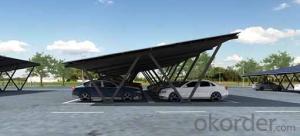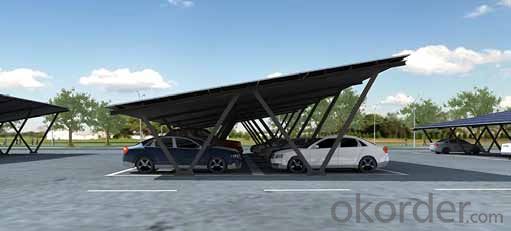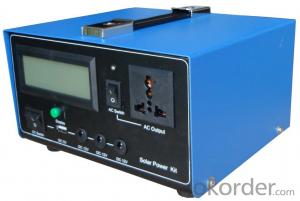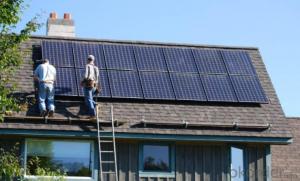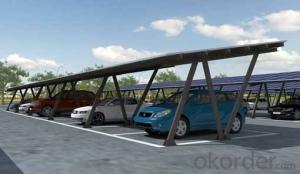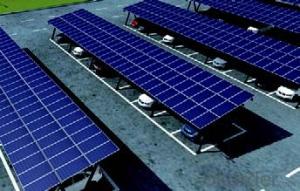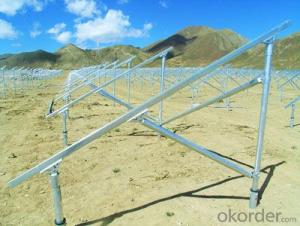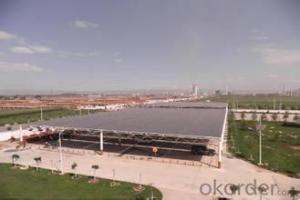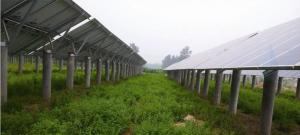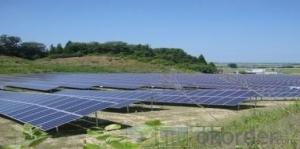Alpha Solar Energy Systems Solar Carport Mounting System
- Loading Port:
- China Main Port
- Payment Terms:
- TT OR LC
- Min Order Qty:
- -
- Supply Capability:
- -
OKorder Service Pledge
Quality Product, Order Online Tracking, Timely Delivery
OKorder Financial Service
Credit Rating, Credit Services, Credit Purchasing
You Might Also Like
Product Features
• No location limitation
• Simple structure, easy & quick installation
• Use standard components, low maintenance cost
• Easy to be packaged, minimized transportation cost
• Removable & reusable
• With waterproof & non-water proof solutions for choice
• Customization available
- Q: How does the angle and orientation of solar panels affect their efficiency?
- The angle and orientation of solar panels play a crucial role in determining their efficiency. The angle of solar panels refers to the tilt or inclination at which they are installed relative to the ground. This angle is usually adjusted to maximize the amount of sunlight that falls on the panels throughout the day. In general, the ideal angle of solar panels depends on the geographical location and the specific purpose of the installation. For regions near the equator, where the sun is more overhead, tilting the solar panels at a steeper angle can help capture more sunlight. Conversely, in regions further from the equator, the optimal tilt angle may be less steep to ensure the panels receive enough sunlight throughout the year, considering the changing angles of the sun during different seasons. The orientation of solar panels refers to the direction they face, usually towards the south in the northern hemisphere and towards the north in the southern hemisphere. This is because the sun's path across the sky tends to be closer to the equator, and facing the panels towards the south/north maximizes their exposure to sunlight. The efficiency of solar panels is directly affected by their angle and orientation. When solar panels are installed at the optimum tilt and orientation, they receive the maximum amount of sunlight, which leads to higher efficiency. This is because the panels can absorb more solar energy, converting it into electricity or heat more effectively. However, if solar panels are misaligned or improperly oriented, their efficiency can be significantly reduced. For example, if the panel is tilted too steeply or facing in the wrong direction, it may not receive enough sunlight, resulting in reduced energy production. Similarly, if the angle is too shallow or the panels are shaded by nearby obstacles, such as trees or buildings, their efficiency will be compromised. In conclusion, the angle and orientation of solar panels are crucial factors in determining their efficiency. Proper alignment ensures that solar panels receive the maximum amount of sunlight throughout the day, optimizing their energy production. Installing solar panels at the ideal angle and orientation is essential for maximizing their efficiency and harnessing the full potential of solar energy.
- Q: Can solar energy systems be used in conjunction with other energy sources?
- Yes, solar energy systems can be used in conjunction with other energy sources. This is known as a hybrid energy system, where solar power is integrated with other sources such as wind, hydro, or traditional grid electricity. These hybrid systems help ensure a stable and reliable energy supply, especially during periods of low sunlight or high energy demands. By combining multiple energy sources, the overall efficiency and resilience of the system can be increased, contributing to a more sustainable and diverse energy mix.
- Q: What is the role of solar-powered water purification systems in providing clean drinking water?
- Solar-powered water purification systems play a crucial role in providing clean drinking water by harnessing the energy from the sun to remove impurities and pathogens from water sources. These systems use solar panels to generate electricity, which powers various purification technologies such as filtration, disinfection, and reverse osmosis. By relying on renewable energy, solar-powered water purification systems can operate in remote areas without access to electricity, making them a sustainable and cost-effective solution. Moreover, these systems reduce dependence on traditional fuel sources and contribute to mitigating environmental pollution. Overall, solar-powered water purification systems are instrumental in ensuring access to safe and clean drinking water, particularly in regions facing water scarcity or contamination issues.
- Q: How does temperature affect the efficiency of solar panels?
- Temperature affects the efficiency of solar panels by causing a decrease in their overall performance. As the temperature rises, the efficiency of solar panels decreases due to the negative thermal coefficient of their photovoltaic cells. This means that as the temperature increases, the voltage output of the cells decreases, resulting in a reduction in the power generated by the panels.
- Q: Can solar energy systems be integrated with other renewable energy sources?
- Yes, solar energy systems can be integrated with other renewable energy sources. This is known as hybrid renewable energy systems. By combining solar energy with sources like wind, hydro, or biomass, the overall system can become more reliable and efficient. Such integration allows for a continuous and balanced power supply, as different sources can compensate for each other's intermittency. Additionally, these hybrid systems can maximize energy production, reduce reliance on fossil fuels, and contribute to a more sustainable and resilient energy infrastructure.
- Q: Can solar energy systems be used for powering off-grid recreational vehicles?
- Yes, solar energy systems can be used to power off-grid recreational vehicles. Solar panels can be installed on the roof of the vehicle to capture sunlight and convert it into electricity. This renewable energy source can charge the RV's batteries, providing power for various appliances and systems while being independent of traditional power sources.
- Q: Are there any tax credits available for solar energy systems?
- Yes, there are tax credits available for solar energy systems. The federal government offers a solar investment tax credit (ITC), which allows homeowners and businesses to deduct a percentage of the cost of installing a solar energy system from their federal taxes. Additionally, some states and local governments also offer their own tax credits or incentives for solar installations.
- Q: Can a solar energy system be installed on a hotel or resort?
- Yes, a solar energy system can be installed on a hotel or resort. In fact, many hotels and resorts have already embraced solar technology as a way to reduce their carbon footprint, lower energy costs, and demonstrate their commitment to sustainability. Solar panels can be installed on the roof or open spaces of the property to harness renewable energy from the sun. This not only allows for self-sufficiency in electricity generation but also creates a positive image for the hotel or resort among environmentally-conscious guests.
- Q: Can solar energy systems be used in areas with limited land availability?
- Yes, solar energy systems can be used in areas with limited land availability through various innovative approaches. For instance, rooftop solar panels can be installed on buildings to utilize the available space efficiently. Additionally, solar energy can be harnessed through the installation of solar panels on vertical surfaces, such as walls or fences, or through the use of floating solar farms on lakes or reservoirs. These creative solutions allow for the utilization of solar energy even in areas where land availability is limited.
- Q: What is a solar thermal system?
- A solar thermal system is a type of technology that utilizes the sun's energy to heat water or air for various applications, such as space heating, water heating, or even electricity generation. It typically consists of solar collectors, which absorb sunlight and convert it into heat, and a system to store and distribute this thermal energy for use when needed.
Send your message to us
Alpha Solar Energy Systems Solar Carport Mounting System
- Loading Port:
- China Main Port
- Payment Terms:
- TT OR LC
- Min Order Qty:
- -
- Supply Capability:
- -
OKorder Service Pledge
Quality Product, Order Online Tracking, Timely Delivery
OKorder Financial Service
Credit Rating, Credit Services, Credit Purchasing
Similar products
Hot products
Hot Searches
Related keywords
